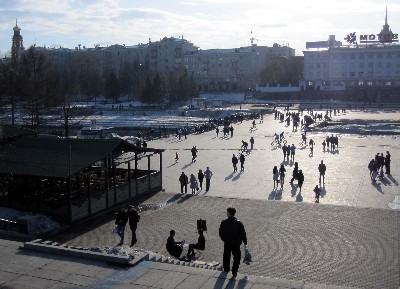All Good Things Come In… Plural! Posted by josefina on Apr 11, 2010 in language, Russian for beginners
Sometimes «грамматика» [grammar] doesn’t make sense. I know this might sound strange coming from me – such a devoted «любитель грамматики» [lover; fancier of grammar] – but even I will have to admit that grammar isn’t always the spotless «логичное зеркало человеческого восприятия мира» [logical mirror of the human perception of the world] that we would like it to be (though I still hold grammar in high regard and my advise to those who don’t like it as much can be summed up in the following sentence: “Don’t fight grammar and it won’t fight you!”). Some nouns in Russian language – as in many other languages as well – are only available for us to use in «множественное число» [plural], even though the ‘thing’ in itself seems to us as being only ‘one’. Speaking the universal language of grammar – everybody’s favorite «латынь» [Latin] – this phenomenon is known as pluralia tantum (into Russian this is translated as «множественное только» [plural only]). This doesn’t have to be a difficult part of Russian language at all. Why is that? Because there are some ‘plural only’ nouns in Russian that are also ‘plural only’ in English. For example:
«Где у тебя ножницы?» [Where do you have (alt. keep) the scissors?]
«У меня нет ножниц» [I don’t have any scissors].
«У неё есть весы?» [Does she have scales?]
«Нет, у неё нет весов» [No, she doesn’t have scales.]
«Ты был в Афинах?» [Have you been to Athens?]
«Нет, но хотел бы съездить в Афины» [No, but I (male) would like to visit Athens].
«Тебе нравится носить очки?» [Do you like wearing glasses?]
«Нет, я бы хотела обходиться без очков» [No, I (female) would like to go without glasses].
«Твои брюки запачканы чем–то» [Your pants are spotted with something].
«Это у меня ноги запачканы; брюк сейчас на мне нет…» [It is my legs that are spotted; I don’t have pants on now…]
That was the easy the part. Now we’ll take the next step and find ourselves handling something a little bit trickier: nouns in Russian which have a different form for plural than for singular. In order to understand this we must start with the two most obvious cases of this in Russian language: «человек» [one person] versus «люди» [persons; people] and «ребёнок» [one child] versus «дети» [children]. Let’s have a look at this:
«На площади много людей» [On the square there are a lot of people].
«Сколько у них детей?» [How many (genitive plural) children do they have?]
«У них только один ребёнок» [They only have one child].
«Много ли людей пришло на твою лекцию по Флоренскому?» [Did a lot of (genitive plural) people come to your lecture on Florensky?]
«Нет, пришёл всего один человек» [No, only one person came].
And then there are those interesting nouns in Russian which are plural only even though logic would have it that they’re only hinting at ONE single thing. (I aced a course in pedagogic once upon a time and the most useful thing I learned in it was to never say something is ‘hard’ or ‘difficult’ but use the adjective ‘interesting’ instead. So I do.) Here are a couple of examples of this:
«Он купил ей новые духи» [He bought her new perfume].
«Но она не носит духов» [But she doesn’t wear (genitive plural) perfume].
«Так скучны мои будни!» [My week days are so boring!]
«А без будней были бы скучны выходные…» [But without (genitive plural) weekdays the weekends would be boring…]
«На похоронах своей матери он впервые увидел своего отца» [On his mother’s funeral he saw his father for the first time].
«И во время похорон заплакал…» [And during (genitive plural) the funeral (he) started to cry…]
«Скоро ли у нас будут каникулы?» [Will we have holiday/vacation soon?]
«Не будет у вас каникул!» [You will not have (genitive plural) holiday/vacation!]
«Когда у него именины?» [When is his (birthday party) name day?]
«Мне кажется, что он не празднует своих именин?» [It seems to me that he doesn’t celebrate his (genitive plural) name day?]
«Кофе без сливок» [coffee without cream] but «к счастью сливки есть в пирожном» [fortunately there’s cream in the cake]!
«Я люблю сливки, без сливок жить не могу» [I love cream, without (genitive plural) cream I cannot live].
«Она купила ему новые часы» [She bought him a new watch].
«Но он не носит часов» [But he doesn’t wear (genitive plural) a watch].
«Встретимся в сумерках…» [We’ll meet in the twilight…]
«А точное время прихода сумерек не подскажешь?» [But you won’t tell (lit. prompt; suggest) me the exact time of the arrival of (genitive plural) twilight?]
And at last but not least there’s one very important noun in Russian which is ‘plural only’ and thus only used in plural – «деньги» [money]:
«Деньги у тебя есть?» [Do you have (any) money?]
«Денег у меня нет» [I don’t have (any) (genitive plural) money].
Or a more positive answer to the same question:
«У меня много денег! Сколько тебе надо?» [I have a lot of (genitive plural) money! How much do you need?]

Build vocabulary, practice pronunciation, and more with Transparent Language Online. Available anytime, anywhere, on any device.






Comments:
Throbert McGee:
One small correction to the first group: In English, “Athens” takes a singular verb, pronoun, etc. (Athens is a beautiful city. It is the home of the Parthenon.).
But words like “scissors,” “pants,” “scales,” etc., take verbs (and pronouns, etc.) in the plural:
“The scissors were too dull to cut the paper. They to be sharpened.”
(But: “The knife was too dull to cut the carrot. It needed to be sharpened.”)
Svetlana:
Hey)
Just a few minor corrections of the word stress.
Correct:
весЫ
на похоронАх
похорОн
канИкулы
канИкул
когдА
Interesting post, as usual 🙂